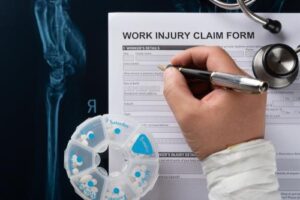
Yes, you can get workers’ compensation for a hernia you suffered on the job. A hernia occurs when an organ pushes through an opening in the muscle or tissue that holds it in place. Hernias can be painful and debilitating, often requiring surgery and significant recovery time.
Heavy lifting, sudden movements, prolonged standing, and chronic coughing are all risk factors for hernias. If you’ve suffered a hernia at work, see a doctor, report the accident to your employer, then contact our Atlanta workers’ compensation lawyers for advice.
Does Workers’ Compensation cover Hernias?
Workers’ compensation can cover hernias if they’re work-related. However, proving this connection can sometimes be challenging. To qualify:
- A work-related activity must have caused the hernia.
- You must report the injury to your employer within the required timeframe (usually within 30 days, but check your state’s specific rules).
- You may need to demonstrate that the hernia didn’t exist before the work-related incident.
Get the strong arm
What Steps Should I Take if I Suspect a Work-Related Hernia?
If you believe you’ve developed a hernia due to your job:
- Seek medical attention immediately. Hernias can become serious if left untreated.
- Report the injury to your employer as soon as possible, preferably in writing.
- Document everything. Keep records of when you first noticed symptoms, what activities might have caused it, and all medical visits.
- Follow your doctor’s orders carefully. Failing to do so could jeopardize your claim.
- File a workers’ compensation claim with your employer or their insurance company.
- Consider consulting a workers’ compensation attorney, especially if your claim is denied.
Can I Choose My Own Doctor for a Work-Related Hernia?
Your employer must maintain a list of at least six doctors, known as the “panel of physicians.” You can choose any doctor from this panel for your initial treatment and have it covered by workers’ comp. This doctor will become your authorized treating physician.
If you’re unsatisfied with your initial choice, you can make one change to another doctor on the panel. Further changes require permission from your employer or the State Board of Workers’ Compensation.
Choosing a doctor outside the approved panel (except in emergencies) may result in you being responsible for the medical bills. Always consult your employer or a workers’ compensation attorney before seeking treatment outside the approved network.
Additional Situations with Doctors
If your chosen doctor believes you need specialized care for your hernia, they can refer you to a specialist. The workers’ compensation insurance carrier usually needs to approve this referral.
In case of an emergency, such as a strangulated hernia, you can seek immediate medical attention from any available healthcare provider. However, follow-up care should be with a doctor from the panel.
Finally, the insurance company may request that you undergo an independent medical examination with a doctor of their choice. While you must attend if requested, remember that this doctor works for the insurance company, not for you. You may wish to find a good worker’s compensation lawyer before your appointment for advice.
What Workers’ Comp Benefits Can I Receive for a Hernia?
If your hernia claim is approved, you may be eligible for:
- Medical treatment: Coverage for doctor visits, surgery, medications, and rehabilitation.
- Temporary disability benefits: If you need time off work to recover, you may receive a portion of your lost wages.
- Permanent disability benefits: In some cases, if the hernia causes lasting impairment, you might be eligible for additional compensation.
Can My Employer or an Insurer Deny Workers’ Compensation for a Hernia?
Yes, employers or their insurance companies may try to deny your claim for reasons like:
- Pre-existing condition: They might argue the hernia existed before the work incident.
- Lack of evidence: Your claim might be denied if there’s insufficient proof that the hernia is work-related.
- Delayed reporting: Failing to report the injury promptly can lead to claim denial. You must report within 30 days of your injury.
- Non-compliance: Not following prescribed medical treatment can result in denial.
If your claim is denied, you have the right to appeal. This is where having a workers’ comp attorney becomes necessary so you don’t end up bearing the cost of a hernia on your own.
How Can I Prevent Work-Related Hernias?
While not all hernias are preventable, you can reduce your risk by:
- Using proper lifting techniques: Lift with your legs, not your back.
- Avoiding overexertion: Don’t try to lift objects that are too heavy for you.
- Taking breaks: If your job involves repetitive motions, take regular breaks to rest.
- Maintaining a healthy weight: Excess weight can strain your abdomen and raise the risk of a hernia.
- Quitting smoking: Smoking can weaken your abdominal muscles and increase your chances of hernia.
You Can Get Workers’ Comp for a Hernia
Developing a hernia at work can be a painful and stressful experience, but workers’ compensation benefits may help you recover. Claim them by reporting your injury promptly, seeking medical attention, and keeping documents to help you fill out your claim form.
If you’re struggling with getting workers’ compensation for a hernia, don’t hesitate to seek legal advice. Our experienced Atlanta work injury lawyers can guide you through the process. Contact John Foy & Associates for assistance.
404-400-4000 or complete a Free Case Evaluation form





